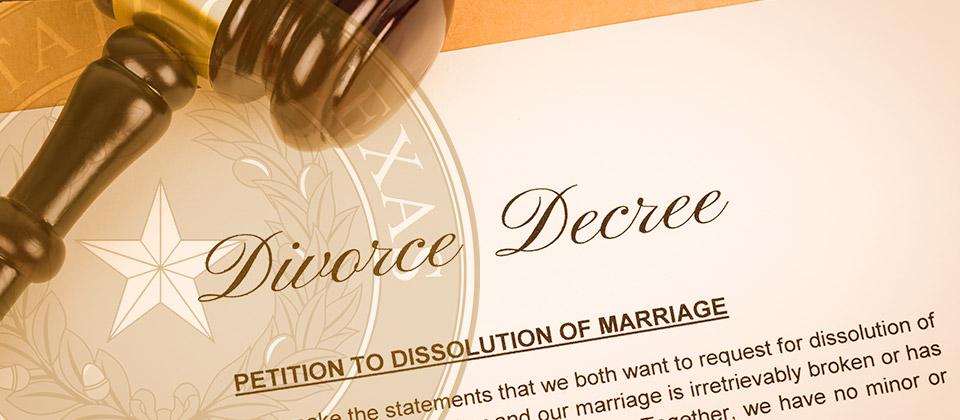Guide to Texas Divorce Records

Texas divorce records are essential documents serving as proof and covering the details of a dissolved marriage. The contained information and how it's handled may vary slightly between states, but divorce records are typically used for legal, genealogical, or governmental processes.
In Texas, these records are publicly available and accessible unless designated otherwise by a court order. Understanding how to obtain these records is important because they're necessary for many tasks following a separation of marriage.
What are Texas Divorce Records?
Divorce records are a single sheet of paper like a certificate. They're a collection of all the court filings from a divorce case. Due to the sometimes messy and protracted nature of divorce filings, it's common for couples to share extensive details about their personal lives with the court.
Texas has three main types of divorce records, which are records, decrees, and pleadings. Each is used for a specific purpose and provides information accordingly.

Divorce Records
A divorce record is the complete history of a divorce case. Any file or information used in the divorce proceedings is kept here, including details of minors, assets, and other sensitive information. Divorce records provide a general idea of the activity timeline of the separation as it includes the motions and requests made by both parties.
Divorce Decree
Divorce decrees are the final document signed by the overseeing judge to end the marriage legally. In some ways, this document acts as a "post-nuptial agreement", as it records promises of support payments, equitable distribution of assets, child custody, and the handling of marital debt.
Once filed, former spouses are legally required to adhere to it. Failure to follow a divorce decree can hold the offender in contempt of court, leading to a fine or even jail time. Divorce decrees are typically requested to amend the terms of the document in cases of significant life change.
Divorce Pleadings
These are the legal documents that kick-start the divorce process. They hold the Original Petition for Divorce, which includes information the case is likely to cover, including:
- Names and ages of children
- Grounds for divorce
- Full names of spouses
- Pending protective orders
- Date of marriage/separation
- Identification of assets
How are Texas Divorce Records Stored?
Texas divorce records are stored by the county or district they're initially filed in. The state's Vital Statistics Unit keeps a database of divorce verification, but these should not be confused with legitimate divorce records. Official copies of divorce decrees and documents can only be obtained through the district clerk of the filing county.
Divorce Statistics in the State

Texas ranks at the lower end of US divorce rates and has maintained its 10 to 10.5 percent statistic for over a decade. Reasons for divorce in Texas can be separated into no-fault and fault-based grounds.
The most popular no-fault reasoning for Texas divorces is an "insupportable marriage", which means that both spouses mutually agree the marriage cannot be repaired for various reasons. However, fault-based reasons explicitly claim adultery as the primary grounds for divorce.
Despite boasting a below-average divorce rate, Texas marriages appear to fall apart faster than the norm. The median length of American unions is roughly 21.5 years when considering repeat marriages. However, Texas marriages last a significantly lower 17.6 years on average.
Official Records vs. Divorce Certificates
While divorce records are an all-inclusive history of your divorce filings, a divorce certificate is a much more concise document. It's typically for proving divorce for legal and administrative purposes such as amending a legal name or updating marital status.
Certificates don't include the specific details or outcomes of the separation of marriage. So, any children's information is excluded, as well as financial details and property division. This makes them a much safer document to make copies of for various purposes.
How to Find Texas Divorce Records and Verification
As previously stated, divorce records and divorce verification are not the same thing. Divorce verification is relatively easy to obtain through the Texas Vital Statistics Unit's online portal. All you need to do is fill out an application and pay $20 to have it shipped.
Some tasks can be resolved with a verification rather than a divorce record, and we recommend double-checking to see what you need. However, if you do need a divorce record, here's how you can obtain it:
Unfortunately, applicants cannot get an official divorce decree or record through the state's online portal as of 2023. They must contact the county clerk's office that ended the marriage. If they cannot remember the issuing body, they can find this information through the Texas Department of State Health Services (TDSHS).

Prepare the relevant information for each of the file to facilitate the search. You'll need:
- Full names of both parties
- Date and place of divorce
- Relationship with either party
- Reason for requesting the information
This process is most straightforward in person, but if you've moved away, you can request the records by mail.
What is Included in Divorce Records
Texas Divorce Records typically include the following information:
- Full names of the divorcing parties
- Dates of birth
- Marriage date and location
- Divorce date and location
- Child custody arrangements
- Property division details
- Alimony agreements
- Asset distributions
- Any restraining orders issued during the divorce process
Omissions and Errors in Divorce Records
While Texas divorce records hold a lot of sensitive information, they aren't great targets for criminals looking to pull off identity theft. Most divorce cases won't need to include specific details like social security numbers or credential information.
However, it's critical to make sure there isn't any missing information or errors in your divorce records. A misspelled name could cause serious legal and financial trouble when attempting to enforce a divorce decree. There's also a chance that payment totals for things like alimony or child support were inaccurately recorded.
Contact Information by Texas County
As with all government agencies, getting a hold of the Texas Department of State Health Services can take a while. It may be quicker to contact individual counties to see if they can help you faster or direct you to the correct county.
Below, you'll find links to the district clerks for Texas' largest counties by population.
| County | URL |
|---|---|
| Harris County | Marilyn Burgess |
| Dallas County | Felicia Pitre |
| Tarrant County | Thomas A. Wilder |
| Bexar County | Gloria A. Martinez |
| Travis County | Velva L. Price |
| Collin County | Michael Gould |
| Hidalgo County | Laura Hinojosa |
| Denton County | David Trantham |
| El Paso County | Norma Favela Barceleau |
| Fort Bend County | Beverly McGrew Walker |
FAQ on Divorce Records in Texas
What's the difference between a divorce decree and divorce verification?
The Texas Vital Statistics Department offers divorce verification letters through its online portal. However, these letters only verify whether a divorce is recorded in the department's database and don't serve as official proof of divorce like a divorce decree or certificate.
Do I need my divorce records to remarry in Texas?
Texas prohibits people from remarrying for at least 30 days after a divorce. When securing a new marriage license, applicants must submit a certified copy of their divorce decree to prove they've exceeded the 30-day waiting period.
Do I have to pay a fee to get my divorce record in Texas?
County Clerk's offices typically charge a small fee to find, certify, and deliver your divorce records. The fee amount is typically less than $10 but varies by county. So, confirm the cost with the specific office you're ordering through.
Can I change the terms of a divorce decree?
Yes, Texas allows divorcees to file a "motion to modify the divorce decree" if there's been a significant change in your or your former spouse's situation. It's possible to amend stipulations regarding alimony, child support, and other factors.
Can anyone request a divorce record in Texas?
Texas divorce records are considered public information, but that doesn't mean anyone can get their hands on them. The clerk's office requires that parties disclose their relationship with the divorcees, and access is typically restricted to immediate family or legal representatives.
How long does receiving a copy of a divorce record in Texas take?
The processing time for obtaining a divorce record will vary depending on the county and the request method. It's advisable to check with the specific district clerk's office for their processing times.
